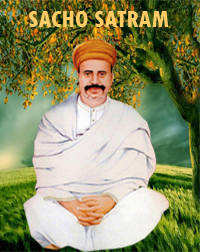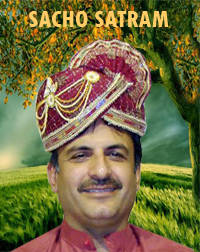In one of his profoundly enlightening Satsangs, Hazir Swaroop Sai Sadhram Saheb lovingly shared a powerful distinction, that the birth of a child and the life that child goes on to live are two very different things. Saijan explained that while birth is a divine gift from Parmatma, the quality and direction of a child’s life are deeply shaped by their upbringing. Being born and truly living are not the same. The foundation laid at home becomes the guiding force that shapes the child’s journey.
There are many who appear virtuous outwardly, but lack integrity and sincerity within. Such individuals, despite their external image, can never serve as genuine role models for their children. Eventually, they falter on the path of life, leaving behind confusion instead of inspiration.
All the customs and rituals performed during a child’s birth are actually intended more for the elders than for the newborn. A baby is too young to understand the significance of these sacred traditions. It is the elders who must absorb their deeper meaning and carry their essence forward through conscious living.
Children and young people naturally absorb the behavior of those around them. They learn not by words alone, but by observing how their elders live. That is why timeless sayings such as “Like mother, like daughter” and “As the king, so the subjects” continue to ring true—they reflect the undeniable influence of example in shaping lives.
Each of us experiences a quiet joy when we’re remembered by name as someone kind, sincere, and noble. Every parent carries the hope of raising their child to reflect such virtues. Just as we instill values through our guidance, we must also remember that the names we give our children carry meaning and energy. A name is not just a label, it reflects one’s identity and sets a spiritual tone for life.
If someone is named Ram, yet behaves like Ravan, people are quick to question the authenticity of that name. On the other hand, a name like Vishvas naturally evokes trust, and people instinctively expect trustworthiness from that person. A name carries the weight of character, and it becomes the sacred duty of parents to not only choose names of strength and virtue but also to raise their children in a way that their names become true reflections of who they are.
The day a child is born is not just a celebration of new life, it is also a silent reminder to the elders of their renewed responsibilities. It is the beginning of a divine investment, where we start depositing values, morals, and principles into the child’s “bank of life.” Over time, these become the guiding forces that shape the child’s character, and the returns of such investments bless both the child and the family.
When these values are genuinely embraced, they bring happiness at every stage of life. A life rooted in goodness is a life fully lived. The arrival of a child becomes more than a joyful event, it becomes a divine opportunity for growth, for everyone around. It opens a channel through which moral values can take root and uplift the collective spirit of the family and community.
When we live with virtue and authenticity, our children naturally imbibe those qualities. They become individuals worthy of admiration, and in their goodness, the world sees the light of our own righteous actions. Hearing praise for our children becomes a blessing earned through the example we set.
Our role is to nurture, support, and guide, but the shape their lives take is ultimately their own destiny. Just as a bird is lovingly cared for in the nest, when the time comes, it must use its own wings to fly.
It’s also important to reflect on how we live our own lives. Most of us spend nearly 80% of our time watching others, imitating them, and conforming to societal patterns. Only a small portion, perhaps just 20%, is truly lived in alignment with our inner instincts and authentic self. Recognizing this can inspire us to become more mindful and intentional, not only for our own sake but for the sake of those who look up to us.



